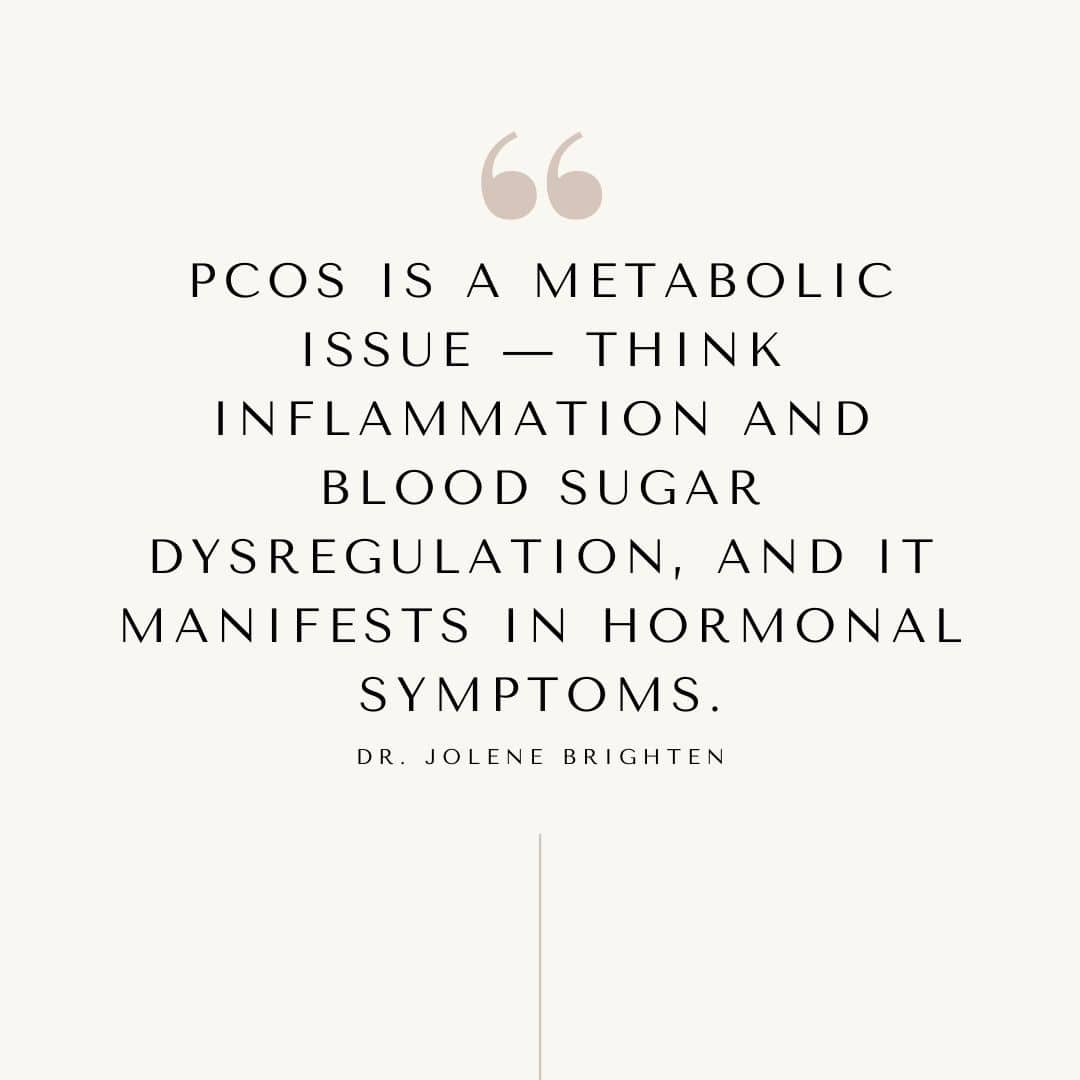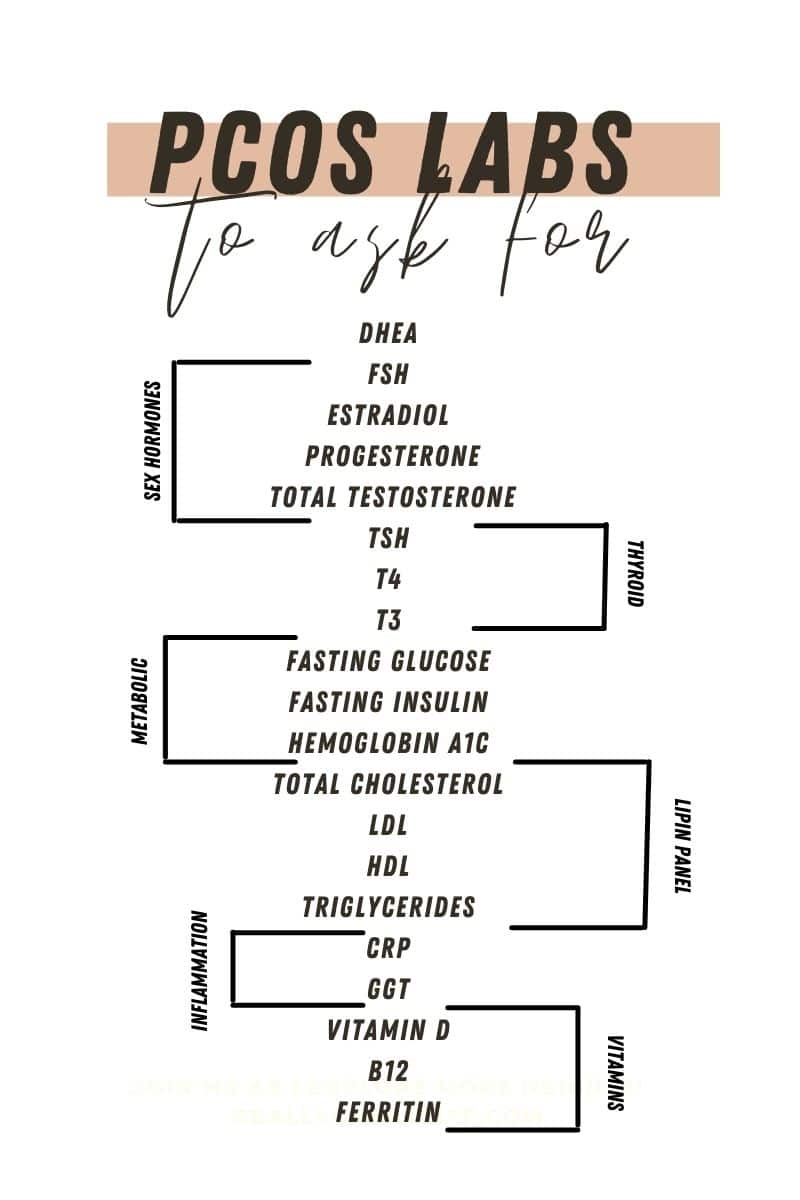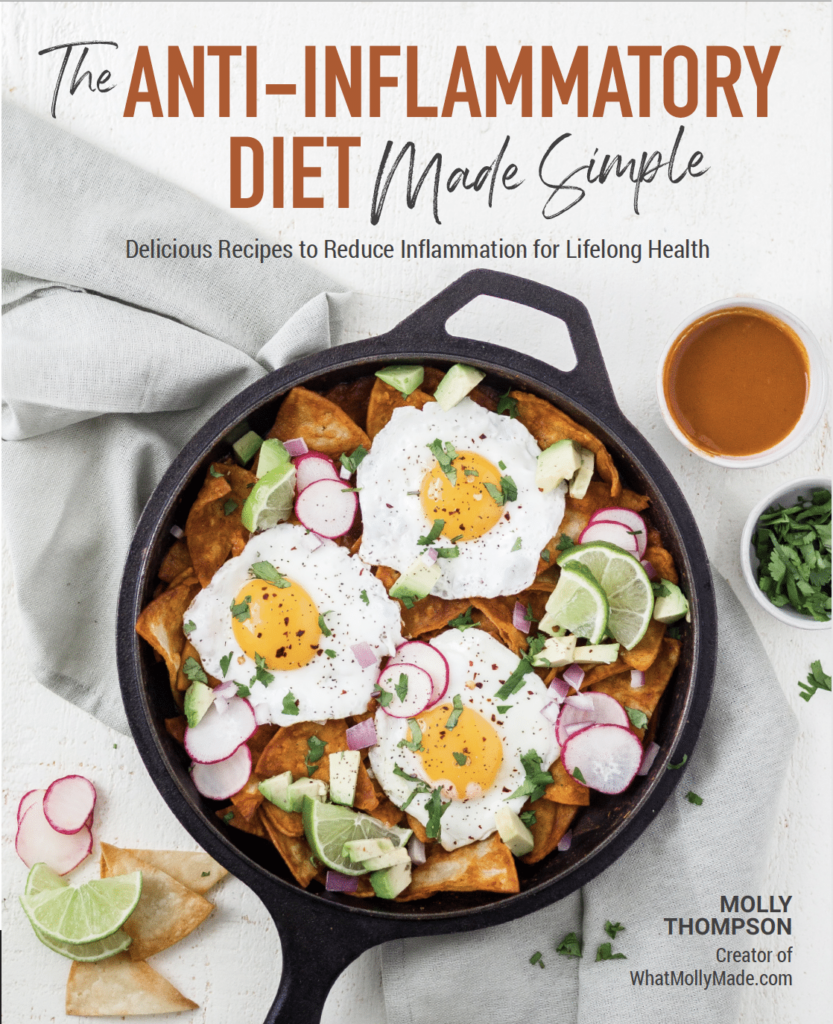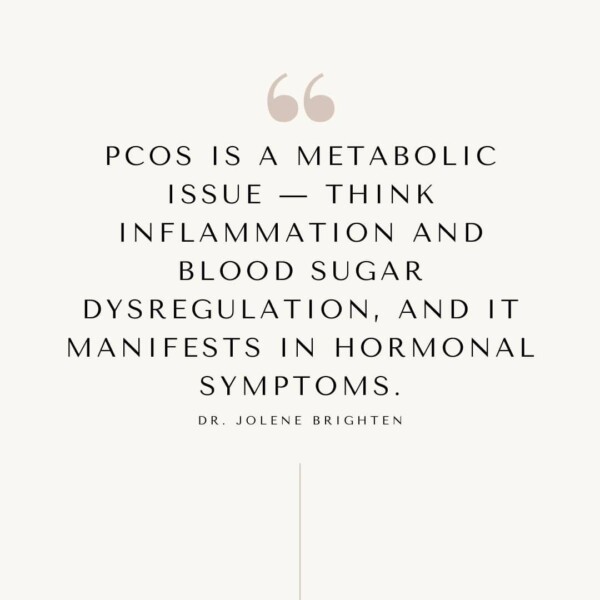I’m sharing an in depth look at my PCOS labs and a comparison of when I was first diagnosed vs postpartum. Three years and one baby later, let’s see what my labs are saying!

Table of Contents
Source: I want to note I am not a doctor, this is a combination of my personal blood work/experience, as well as information shared from my functional CNP, as well as what I’ve learned from Dr. Jolene Brighten and Dr. Lara Briden.
If you’re new here, I’ve been sharing my PCOS journey for a few years now! I shared when I was first diagnosed with PCOS, my anti-inflammatory diet, my initial pcos blood work, all of my pcos supplements, how we conceived on the first try and more!
What is PCOS?
At the root, PCOS is a metabolic issue. Inflammation and blood sugar dysregulation manifests in hormonal problems. Those hormonal issues include weight gain, acne, infertility, irregular periods and hair loss, among many more.
The name, Polycystic Ovarian Syndrome, is misleading because it doesn’t mean you have cysts on your ovaries (see diagnostics below for more info).
According to Dr. Jolene Brighten, “Symptoms of PCOS are the result of insulin and inflammation messing with your cells. The insulin resistance is what drives increased weight gain and the ovaries to produce testosterone. The excess testosterone leads to acne, hair loss, hair growth on the face and abdomen, along with irregular cycles and infertility.”
PCOS FAQs
The most notable PCOS lab are excess androgens. You may also have insulin resistance or high blood sugar.
Androgen excess: this would show up on blood work or physical signs of excess androgens like facial hair.
Polycystic ovaries: which means you have extra follicles from eggs maturing but then not releasing (aka ovulating). This doesn’t mean you have cysts on your ovaries.
Ovulatory disfunction: most commonly irregular cycles but this could also be anovulatory cycles or very heavy cycles.
1. Insulin resistant
2. Inflammatory
3. Post-pill PCOS
4. Adrenal PCOS
Learn more about the types of PCOS here.
While PCOS technically can’t be cured, it can be reversed and you can put your symptoms in remission through diet and lifestyle changes.
Weight gain, irregular cycles, acne, hair growth (hirsutism), infertility, recurrent miscarriage and more.

PCOS labs to order
After you’ve been diagnosed with PCOS, it is CRITICAL to get blood work done so you know exactly what’s going on in your body. PCOS is a spectrum. There are different types of PCOS and you can fall anywhere on the spectrum, so knowing your labs will help you understand and treat your PCOS.
Here is a list of labs my functional CNP, Julie Grafmeyer ordered for me:
- DHEA
- Sex hormones: FSH, estradiol, progesterone, total testosterone
- FULL thyroid panel: TSH, T4, T3, Reverse T3
- Metabolic: Fasting glucose, fasting insulin, Hemoglobin A1c
- Lipid panel: Total cholesterol, LDL, HDL, Triglycerides
- Inflammatory panel: CRP, GGT
- Vitamins: Vitamin D, B12, Ferritin

Prefer to watch instead of read? Watch this video!
2020 Postpartum PCOS Labs (compared to 2018)
DHEA:
What is it? This is a reflection of your adrenal health.
DHEA: 215.9 (2018), 181 (2020)
Reference Range: 84.8-378
How to improve and maintain adrenal health: Take magnesium (I take Pure Encapsulations Magnesium Glycinate), minimal caffeine, licorice tea, sleep and other “relaxing practices” like yoga, medication, acupuncture, massages etc.
Sex Hormones:
What are they? These numbers all work together at certain parts of our cycles for separate reasons. FSH helps grow the follicle, while progesterone begins to rise right after ovulation and peaks right before your period starts.
Reference range: I can’t share reference ranges because they change depending on what day you are in your cycle.
FSH: 4.3 (2018), 4.9 (2020)
LH: TBD (2018), 5.5 (2020)
Estradiol: 25.8 (2018), 26.5 (2020)
Progesterone: 8.5 (2018), TBD (2020)
Total testosterone: 22.9 (2018), 21.4 (2020)
How to improve and maintain sex hormone health: Follow an anti-inflammatory diet (order my anti-inflammatory diet cookbook!) and do things that improve overall health like sleep, gut health and stress management. A few good articles: how to increase progesterone naturally and how to balance hormones naturally.
Thyroid
What is it? Your TSH is the hormone that your brains (pituitary gland) sends to your thyroid organ that signals it to make thyroid hormone, while the T3 and T4 is the actual thyroid in your blood produced by the thyroid. When you have increased levels of TSH and low levels of Free T3 and T4 (like me), your brain keeps telling your body to make more thyroid, but your body doesn’t do it.
TSH: 5.01 (2018), 5.23 (2020)
Free T4: 1.09 (2018), 1.03 (2020)
Free T3: 2.6 (2018), 2.7 (2020)
How to improve thyroid: eat more nutrients with iodine, selenium and zinc. Also watch soy intake, especially soy protein isolate products like powders and bars. Also try to avoid sports drinks that contain bromine. They also put me on a natural thyroid supplement to help boost it. It’s actually true thyroid hormone from a pig(!!).
Metabolic
What is it? A lot of times in PCOS, these numbers are elevated because PCOS is closely tied with insulin resistance. Insulin’s job is to clear sugar from the bloodstream and insulin resistance is when the body becomes resistant to insulin and is a major contributor to diabetes. High insulin levels lead to to an appetite that is out of control and increased weight gain, especially around the belly. That’s why balancing blood sugar is so key to women with PCOS.
Fasting glucose: 89 (2018), 94 (2020)
Fasting insulin: 5.4 (2018), 6.4 (2020)
Hemoglobin A1c: 5.1% (2018), 5.2% (2020)
How to improve: Avoid an abundance of quickly absorbed sugars and carbs and focus on eating lots of veggies, protein, healthy fats and fiber with every meal. Eating enough and often to avoid spikes and drops in blood sugar is critical. Supplements that help balance blood sugar include berberine and myoinositol.
Lipid Panel
What is it? The cholesterol found in your blood. A good lipid profile reduces risk for cardiovascular disease and stroke.
Total cholesterol: 201 (2018), 239 (2020)
Reference range: 100-199
LDL: 120 (2018), 153 (2020)
HDL: 72 (2018), 69 (2020)
Triglycerides: 47 (2018), 85 (2020)
How to improve: If you have a high lipid panel, eat a healthy diet, balance blood sugar and take at least 2000 – 4000 mg of omega-3 fats (fish oil) as part of your supplement plan.
Inflammation
What is it? CRP is the main marker for the amount of inflammation and GGT is the marker for oxidative stress in the body. Inflammation can lead to many diseases including heart, cancer, and dementia as well as arthritis, autoimmune disease, allergies and digestive disorders.
CRP: .3 (2018), <1 (2020)
GGT: 12 (2018), 8 (2020)
How to improve: Eat an anti-inflammatory diet. You should also target inflammatory culprits: avoid processed foods, exercise more, reduce stress, avoid food allergies, identify hidden chronic infections, avoid mold, reduce environmental toxins (like skincare products)
Vitamins
Vitamin D: 34.7 (2018), 30 (2020)
B12: 1196 (2018), 566 (2020)
Ferritin: 106 (2018), 54 (2020)
How to improve: take specific vitamins that help each vitamin.

MY COOKBOOK IS AVAILABLE FOR PRE-ORDER!
This book is full of 100+ simple, PCOS-friendly recipes for feeling your best, reducing inflammation and healing your body from the insides out.
Did my PCOS go away after pregnancy?
One of the things I was most curious about before measuring labs was if pregnancy helped level out my hormones. They say pregnancy can truly be a hormone reset.
For me, that wasn’t the case. My numbers were pretty much in line with what they were when I was first diagnosed except my TSH and cholesterol were worse.
What I’m focusing on to heal
- Balancing my blood sugar: eating protein, fat, greens and fiber at three meals per day and avoiding sugar.
- Eating an anti-inflammatory diet: this reduces inflammation and as a result heals PCOS and other inflammatory diseases.
- Taking my supplements: these are so important in addition to a healthy diet.
- Minimizing stress: I’m doing this through a lot of ways like getting enough sleep, going on walks, meditating and taking supplements.
- Move my body: I’m focusing on working out most days (5-6), with a focus on light cardio/HIIT and strength training.
Thanks for joining me on this crazy PCOS journey! I truly believe our pain is never wasted and I want to use my experience to help as many people as I can who are going through what I went through.
As always, please email me or message me on Instagram if you ever have any questions or comments. You can also find all of my PCOS tips here.
More posts you might like:
- PCOS Supplements
- Seed cycling for hormones and fertility
- My anti-inflammatory diet
- Types of PCOS and how to know which one you have
This post may contain affiliate links. Read our disclosure policy.











